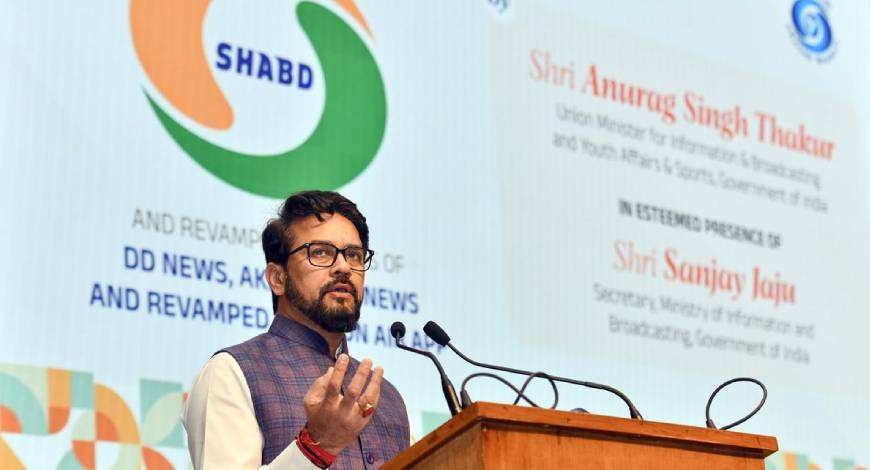Headlines Of The Day
Centre notifies cinematograph (certification) rules, 2024

The Central government has notified the Cinematograph (Certification) Rules, 2024, in order to improve the process of certification of films for public exhibition.
“These new rules aim to streamline and modernise the film certification process for the digital age, keeping pace with the emerging technologies and advancement in the film sector,” said the Information & Broadcasting Ministry on March 15.
The Ministry and the Central Board of Film Certification (CBFC) had earlier undertaken extensive consultations with filmmakers, cinema owners, disability rights organisations, non-government organisations, film industry bodies, the general public, and other stakeholders, to ensure an all-encompassing and all-inclusive approach, it said.
“A comprehensive revision of the Rules has been done to fully align it with the adoption of online certification processes, which will ensure enhanced transparency, efficiency and ease of doing business for the film industry,” said the Ministry. There is a reduction in timelines for the processing of film certification.
The rules introduce age-based categories of certification by further subdividing the existing UA category into three age-based categories: seven years (UA 7+), 13 years (UA 13+), and 16 years (UA 16+), instead of 12 years.
“These age-based markers would be only recommendatory, meant for the parents or guardians to consider whether their children should view such a film. The age-based certification system with UA markers to be implemented to ensure young viewers are exposed to age-appropriate content. It will play a crucial role in balancing the need to protect vulnerable audiences, such as children, with the principles of freedom of expression and consumer choice,” it said.
In the CBFC Board, one-third of the members will be women and preferably half will be women. Also, a new provision allows for the film to be screened expeditiously for certification, in case of any urgency felt by film-maker(s) due to their prior commitments of release of the film.
The new rules also provide perpetual validity of CBFC certificates, instead of the previous 10-year period. An edited film for television broadcast, as only unrestricted public exhibition category films can be shown on television, will be recertified.
The government had last year amended the Cinematograph Act, 1952, after almost 40 years.
Addressing accessibility
In another development, the government has notified the guidelines for the accessibility of persons with hearing and visual impairment to films.
The feature films that are for public exhibition in cinema halls/movie theatres for commercial purposes will have to follow the guidelines. All the films to be certified in more than one language have to comply with the rules within six months and the others within two years.
The guidelines provide at least one accessibility feature each for the hearing impaired and visually impaired viz. closed captioning and audio description.
The Central government has notified the Cinematograph (Certification) Rules, 2024, in order to improve the process of certification of films for public exhibition.
“These new rules aim to streamline and modernise the film certification process for the digital age, keeping pace with the emerging technologies and advancement in the film sector,” said the Information & Broadcasting Ministry on March 15.
The Ministry and the Central Board of Film Certification (CBFC) had earlier undertaken extensive consultations with filmmakers, cinema owners, disability rights organisations, non-government organisations, film industry bodies, the general public, and other stakeholders, to ensure an all-encompassing and all-inclusive approach, it said.
“A comprehensive revision of the Rules has been done to fully align it with the adoption of online certification processes, which will ensure enhanced transparency, efficiency and ease of doing business for the film industry,” said the Ministry. There is a reduction in timelines for the processing of film certification.
The rules introduce age-based categories of certification by further subdividing the existing UA category into three age-based categories: seven years (UA 7+), 13 years (UA 13+), and 16 years (UA 16+), instead of 12 years.
“These age-based markers would be only recommendatory, meant for the parents or guardians to consider whether their children should view such a film. The age-based certification system with UA markers to be implemented to ensure young viewers are exposed to age-appropriate content. It will play a crucial role in balancing the need to protect vulnerable audiences, such as children, with the principles of freedom of expression and consumer choice,” it said.
In the CBFC Board, one-third of the members will be women and preferably half will be women. Also, a new provision allows for the film to be screened expeditiously for certification, in case of any urgency felt by film-maker(s) due to their prior commitments of release of the film.
The new rules also provide perpetual validity of CBFC certificates, instead of the previous 10-year period. An edited film for television broadcast, as only unrestricted public exhibition category films can be shown on television, will be recertified.
The government had last year amended the Cinematograph Act, 1952, after almost 40 years.
Addressing accessibility
In another development, the government has notified the guidelines for the accessibility of persons with hearing and visual impairment to films.
The feature films that are for public exhibition in cinema halls/movie theatres for commercial purposes will have to follow the guidelines. All the films to be certified in more than one language have to comply with the rules within six months and the others within two years.
The guidelines provide at least one accessibility feature each for the hearing impaired and visually impaired viz. closed captioning and audio description.
Accessibility features will be deployed by licensees of cinema theatres by using customised equipment, mobile apps or other available technologies during the regular show.
The Ministry said I&B Minister Anurag Thakur, carrying forward the vision of Prime Minister Narendra Modi, had recognised the essentiality of having accessibility standards for cinemas so that “Divyangjan” could partake in the cinematic journey.
“These accessibility standards, meticulously crafted following in-depth consultations with disability rights groups, cinema exhibitors, research scholars, and movie producers, represent a significant stride forward towards inclusivity. These new guidelines will pave the way for persons with hearing and visual impairments to fully experience the cinema fostering their inclusion in the mainstream society,” it said.
Starting January 1, 2025, films submitted for prestigious events like the National Film Awards and the International Film Festival will also need to comply with the guidelines.
A dedicated committee appointed by the Ministry, with half its members being persons with hearing/visual disabilities and representatives from the film industry, will oversee the implementation. Viewers can also file complaints with theatre licensees. The committee will address their concerns within 30 days through the licensing authority. The Hindu






